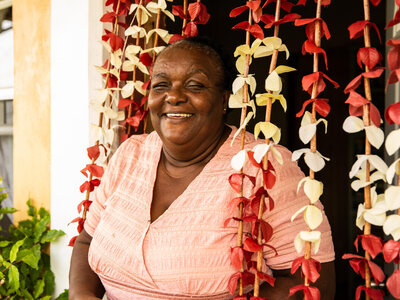The Caribbean
- 43%
- of people are facing food insecurity
- 324
- disasters in 60 years
- 7.1 million
- population
The English and Dutch-speaking Caribbean comprises several Small Island Developing States that face similar challenges in managing economic, financial, geographic and climate-related impacts that affect the food and nutrition security of the most vulnerable, particularly in crises. These countries and territories are also exposed to hazards such as droughts, earthquakes, floods, hurricanes, storms and volcanic eruptions.
Hurricane Melissa left a trail of destruction across the Caribbean in late October and early November 2025, affecting almost 6 million people across Cuba, Haiti and Jamaica.
The World Food Programme (WFP) carried out emergency food distributions for the worst-affected families. WFP also supported millions of people through cash transfers and early warnings ahead of the storm, which helped protect lives and livelihoods.
The high cost of living and the lingering impact of COVID-19 are driving food insecurity in the region. High-energy prices are further exacerbating the food-price crisis and affecting the affordability and consumption of food, especially for the poorest families.
What the World Food Programme is doing in the Caribbean
-
Vulnerability analysis and mapping
-
WFP Caribbean supports vulnerability and risk analysis, assessments and monitoring of cash programmes, and the introduction of innovations such as digital solutions – including remote surveying – to increase accountability and service delivery, and to inform decision-making. WFP works with partners in the Caribbean to strengthen food security analysis, early-warning systems and mapping capacities. This includes support to monitoring, analysis and forecasting of hazards for early action, and development of contingency plans. WFP supports governments in developing mechanisms tailored to the national context, to monitor and identify vulnerable groups. These efforts inform governments’ procedures, policies and programmes.
-
End-to-end supply chain management
-
Social protection
-
Food systems strengthening
-
Disaster Risk Financing and Anticipatory Action
Find out more about the state of food security in The Caribbean
Operations in The Caribbean
Contacts
Office
UN House, Marine Gardens, Hastings, Christ Church
Barbados
Barbados







